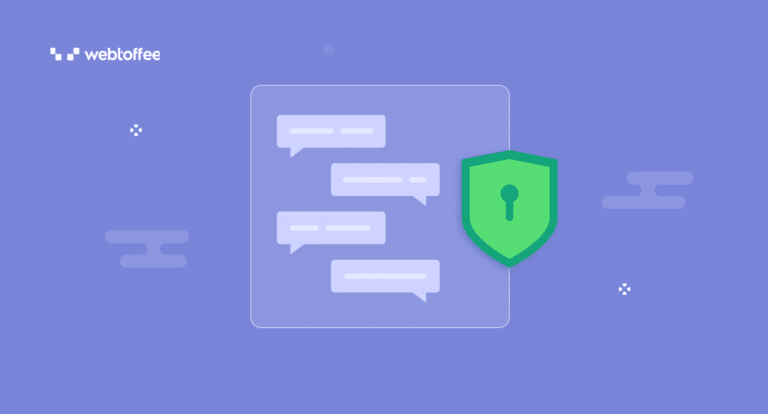In today’s data-driven world, the emergence of generative AI has raised some concerns related to data privacy. In this article, we delve into the complexities of Generative AI and explore the privacy concerns associated with it.
Generative AI has been the talk of the town for some time. It has revolutionized the way machines generate text, images, and graphics. As this technology continues to advance, it raises a host of concerns regarding data privacy.
If you are someone who is curious about the privacy concerns related to generative AI for your business, this article may interest you. You will learn the potential challenges of generative AI and how to mitigate those challenges to protect your data privacy.
Now that we’ve set the context, let’s begin.
Generative AI is a subset of artificial intelligence that uses patterns from a pool of information to generate new data and information. In the past, AI was mainly used to identify patterns and classify data from a dataset. Now, with generative AI, things have advanced. It uses algorithms and machine learning for automated decision-making, profiling, and creating new information.
Generative AI is commonly used to generate images, designs, text, videos, etc. Services like ChatGPT and Google’s Bard are an advanced model of generative AI that is capable of engaging in human-like conversations. Nowadays, major tech companies are actively incorporating generative AI into their products and services, signaling a significant investment in this evolving technology.
Popular Generative AI Tools
Now, let’s have a look at the popular generative AI tools available now.
Understands and responds contextually.
| Tool | Description | Use Cases |
| ChatGPT | Dynamic language model for human-like conversation. Understands and responds contextually. | Customer support with interactive chatbots, Assists writers in brainstorming. |
| AlphaCode | Coding assistant leveraging generative AI for code writing, bug resolution, and optimal programming solutions. | Streamlines coding workflows and accelerates project development |
| GitHub Copilot | Collaborative coding tool integrated with popular code editors. Provides code snippets, explanations, and context-based guidance. | Accelerates coding processes and helps learn new concepts |
| GPT-4 | Advanced AI language model with improved text generation across domains. | Helps in content creation for writers, bloggers, and marketers |
| Bard | Chatbot and content-generation tool by Google, leveraging LaMDA transformer-based model. | Helps in brainstorming, coding, researching, and writing creative content. |
| Synthesia | AI tool for generating lifelike videos from text inputs. Employs advanced deep learning techniques for realistic visuals and voice synthesis. | Assists marketers in creating advertisements and marketing campaigns. |
| Adobe Firefly | A generative AI tool that helps you bring your ideas to life in a variety of ways, from text and images to video and 3D models. | Create social media posters, Edit your images, Creative banners, posters, and images. |
As you know, generative AI relies on data to create or modify a piece of content. It requires large amounts of datasets for training. If these datasets contain sensitive information, there is a risk of accidental exposure, unauthorized access, and potential privacy breaches.
Here are some of the key privacy concerns associated with generative AI:
- Data leakage: Large Language Models have the ability to memorize vast amounts of data, leading to a potential risk of information leakage. Once trained with sensitive information about an individual, these models may inadvertently share the acquired information with anyone.
For example, if ChatGPT is trained using data sourced from Facebook, a search for an individual could potentially reveal personal details such as mobile numbers, location information, email addresses, and more from their social media profiles. This shows the potential risk of privacy breaches associated with the use of sensitive data in training AI models.
- Misuse of Information: Users might input private or sensitive information into generative AI models, either intentionally or unintentionally. If the model is not designed to handle and protect such information, there is a risk that generated content could expose private details.
- Identity theft: Generative AI has the ability to create realistic content using deepfake technology. This could lead to misinformation, identity theft, and damage to individuals’ reputations. This actually happened in many parts of the world, mainly targeting celebrities.
News: Last year, in 2023, Actor Tom Hanks reported a deceptive deepfake version of himself in an advertisement for dental plans. (Source: The Guardian.com)
- Lack of Control: The use of generative AI in creating content that mimics human expression also poses ethical questions about consent, especially when generating content involving real individuals without their knowledge. Users may not have sufficient control over the information they input into generative AI systems. Once data is submitted, users may not have the ability to retract or delete it, leading to potential privacy concerns.
- Potential data breaches: By integrating services that use generative AI into business systems, companies introduce potential data breaches and privacy violations. They need to conduct periodic risk assessments and implement effective security measures to mitigate these risks.
As generative AI continues to evolve and expand in the coming years, there is a growing need for regulations to ensure the responsible and ethical use of this powerful technology. Even though we have strong data protection laws like GDPR and CCPA, the scope of AI is far beyond that.
The GDPR ensures that data subjects have the right not to be subjected to automated decision-making and profiling that result in legal effects on the individual. However, we need a more explicit privacy law to address the privacy concerns of generative AI.
The European Union’s proposed AI Act emerges as a significant step toward addressing these concerns. The Act aims to regulate the use of Artificial Intelligence and provides guidelines to ensure the responsible development and use of this innovative technology.
It encompasses the AI systems used in different services and categorizes them based on the risks they pose to users. There will be different risk levels and compliance requirements for each level. Although the act was initially expected to come into force in 2023, as of January 17, 2024, it has not yet been enacted. Once this act comes into force, it will be the world’s first regulation of AI.
Also Read: Five Years of GDPR: A Look Back at the Impact of the EU’s Data Protection Law
Mitigating privacy concerns associated with generative AI involves implementing several measures to protect individuals’ privacy. If your business has integration with Generative AI and uses data from your customers or clients, make sure that you do not collect any sensitive information from them.
Below are some strategies that can help you mitigate the privacy concerns related to generative AI for your business.
- Minimize the amount of data collection: Prioritize data minimization as the initial measure to safeguard your customers’ privacy. Having less data not only simplifies data protection efforts but also minimizes the potential risks. Limit the information shared with generative AI models to only what is essential, and refrain from using it for purposes other than its intended use.
- Obtain consent from your users: Consent is really important. No matter whether you are collecting sensitive information or not. Always ask for consent from your users before collecting or processing their data. Respect the privacy rights of your users and make sure they are aware of how their data will be used. Also, provides users with the option to opt out of their personal data being used by AI systems.
- Anonymize the user data: Anonymize any personally identifiable information shared with the generative models to ensure that any generated content cannot be traced back to specific individuals. This prevents AI models from accidentally exposing sensitive data about individuals.
- Complying with data protection regulations: Ensure compliance with privacy laws applicable to your business and stay informed and up-to-date with any changes or amendments.
- Conduct privacy impact assessments: Regularly monitor your data handling practices and conduct impact assessments and privacy audits of generative AI systems. This helps to identify and address potential privacy risks.
- Implement data security measures: Make sure that you have proper data encryption techniques and measures in place to safeguard your users’ data shared with generative AI models.
Also Read: Privacy in the Age of Digital Surveillance
Conclusion
Generative AI is an innovative technology that uses artificial intelligence to generate content based on a given dataset. Since it has the ability to store and memorize bulk amounts of data, there are huge potential privacy risks.
To mitigate those risks we need strong data protection regulations and follow responsible data handling practices. While the EU’s AI Act is yet to be implemented, there is an optimistic expectation that it will establish a more secure space with a balance between innovation and privacy.
We hope this article has helped you understand about generative AI and the privacy concerns related to it. If you have any queries, drop them in the comments section below.



